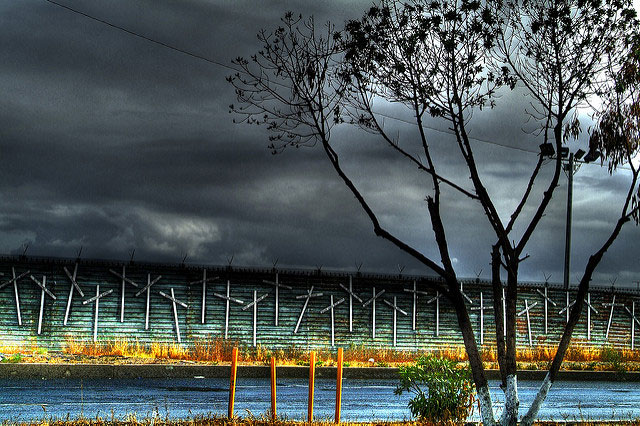
There are approximately 12 million undocumented immigrants in the United States; of those, about 70 percent were born in Mexico or the countries of Central America. It is being sparsely reported that US immigration officials have began executing raids on the homes of Central American mothers and children who crossed the border “illegally.”
Most people take borders for granted, but unlike mountains or rivers, they are not natural. Borders are first imagined, and then drawn, entrenched and legitimized by people. Like all constructs, they tell us a lot about the creators. When we talk about things like immigration, the US-Mexico border and undocumented immigration status, we actually are saying a lot more about ourselves than about the phenomena of people moving from one place to another.
A simple definition holds that a border is a political boundary distinguishing one nation-state from another. This is the understanding that most of us take for granted, and since almost everyone on the planet is born in a nation-state, we take these boundaries at face value. But to say we have borders because we have countries or that we have countries because we have borders is both teleological and tautological and neither proves a thing.
The US border is an extension of a colonial legacy, by which European settlers displaced Indigenous communities and accumulated wealth largely through unpaid Indigenous and Black labor. The formation of these colonies — and later the United States — as articulated through founding documents, identified the community as white and male, with other, racialized people existing outside the bounds of the imagined community.
It is no coincidence that today, these borders halt the travel of people, many of Indigenous, Black or mixed ancestry, through communities that have cross-border ties much older than the US. In this way, borders function to dismantle pre-existing communities and decide whom to accept and whom to reject from nation-state and imagined community, further consolidating the settler-colony.
Harsha Walia, a social justice activist and journalist, tells us that borders are constructs and that they serve an imperialistic purpose. Borders represent practices used to legally coerce displaced migrants into precarious labor and criminalized existence. In her work, Undoing Border Imperialism, Walia offers a framework termed “border imperialism,” which is a system that controls the flow of people, themselves fleeing the military or economic violence of empire, who are racialized and economically exploited by their illegalization.
Peering into the current state of relations between the US, Mexico and Central America, we find ample evidence to support Walia’s claim. As the free flow of corporate wealth through trade agreements and partnerships increases, masses flee the US-led war on drugs or escape the political fallout of US economic interests. Furthermore, the criminalization of the border leads to the incarceration of human beings, whose chief offense is existing on the wrong side of a line. We find strong evidence to support the notion that borders do function as tools of empire, in that undocumented workers supply the United States an easily exploitable secondary labor pool that provides both inexpensive workers and disciplines any potential labor movement.
Much of the anxiety around the US-Mexico border is coded in language around “crime“ and “terrorism,” but with data pointing to the fact that undocumented immigrants represent neither threat, the anxiety around the border tells us much about the US. Our insistence on the violent and exploitative function of borders is our acquiescence to a discriminatory system, that in a legal, political and economic sense, renders some more equal than others and erects borders in our common humanity. More tangibly, border politics create legal and economic of exploitations, by which people are illegalized and thrust into a secondary labor market or detention centers without any legal protections, so as to continue global exploitation within the boundaries of the US. Consider the US border not to be for your safety, but to perpetuate the exploitation of the periphery on bodies of marginalized people within the nation-state.
Our most important fundraising appeal of the year
December is the most critical time of year for Truthout, because our nonprofit news is funded almost entirely by individual donations from readers like you. So before you navigate away, we ask that you take just a second to support Truthout with a tax-deductible donation.
This year is a little different. We are up against a far-reaching, wide-scale attack on press freedom coming from the Trump administration. 2025 was a year of frightening censorship, news industry corporate consolidation, and worsening financial conditions for progressive nonprofits across the board.
We can only resist Trump’s agenda by cultivating a strong base of support. The right-wing mediasphere is funded comfortably by billionaire owners and venture capitalist philanthropists. At Truthout, we have you.
We’ve set an ambitious target for our year-end campaign — a goal of $250,000 to keep up our fight against authoritarianism in 2026. Please take a meaningful action in this fight: make a one-time or monthly donation to Truthout before December 31. If you have the means, please dig deep.